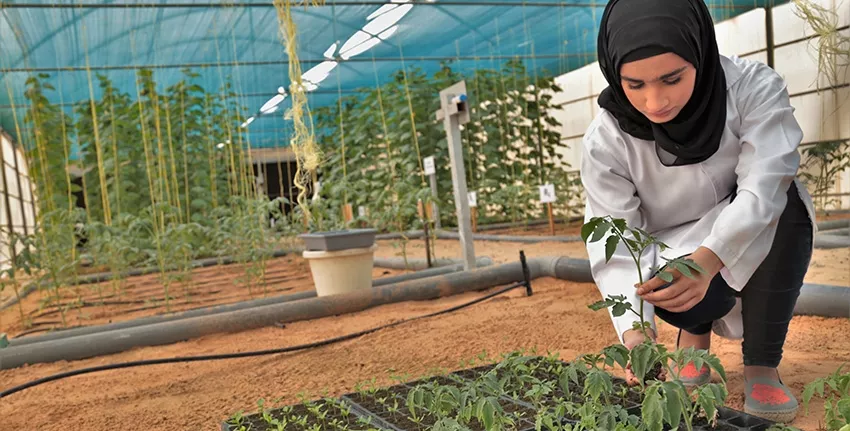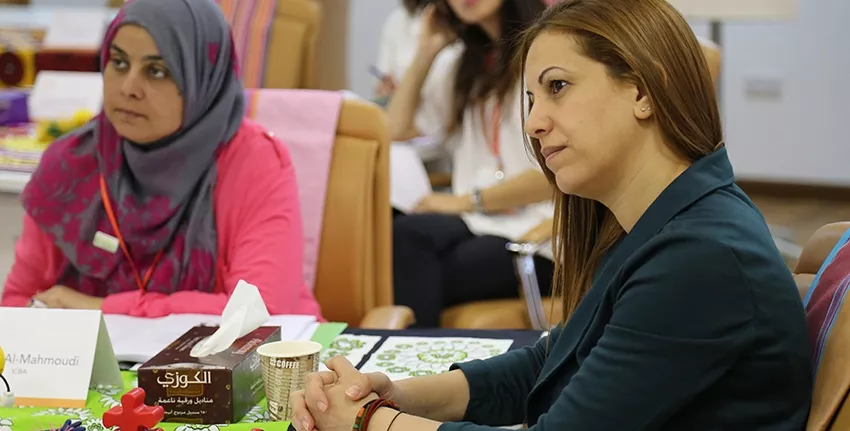Why Arab world needs more young women scientists for food-secure future
31 August 2017
Innovation is everything. These words perhaps best describe our age. Today’s world is defined by a constant search for scientific and technological advances. Throughout history innovation has proven a powerful tool in tackling threats to humanity and steadily improving its wellbeing. Our generation is now reaping the rewards of many breakthroughs made over the past century or so.
But our times are also unique in that many of our most profound problems arise from our past achievements. We face a new breed of challenges, some of our own making, that threaten to undo decades of progress in different areas of life. From climate change to population growth, the list is long and daunting. And many of the problems are interrelated in one way or another. Climate change, for example, is forecast to adversely affect food security in many parts of the world over the coming decades. More recurrent and severe droughts already cause great social and economic damage in water-scarce regions.
Against a backdrop of forecasts of the global population reaching 9.7 billion by 2050, the prospect of mass food shortages looks grim. According to the Food and Agriculture Organization of the United Nations, food production will need to go up by as much as 60% to meet the future demand.
Yet some scientists warn that industrial agriculture might be reaching its limits to produce enough food. What is more, yields of major crops are projected to fall by 25% and more by 2050.
Agricultural research and innovation has helped to increase global food production by as much as 80% since the mid-1960s, with more than half of the increase having happened in developing countries.
In the face of this century’s predicaments, the global food system needs a new wave of research and innovation to feed more people nutritiously and sustainably by 2050. Governments should spend more generously on the development of new and alternative ways of food production.
Ironically, developing countries that are most prone to food insecurity lag far behind the developed world in terms of investment in agricultural research and innovation. This is particularly true of regions like the Middle East and North Africa where climate change and population growth are a cause of concern.
But underfunding is not the only problem. At a time when the agricultural sector in the region needs more research and innovation than ever before, agricultural science is still largely viewed as the preserve of men. Empirical evidence shows that there is a disproportionately low number of women working in senior scientific and managerial positions. The average share of women scientists across the region stands at 17%, which is the lowest in the world.
This gap is most visible in the staffing of agricultural research and extension organizations. This is odd given that women make up more than 40% of the labor force in the sector. As a result, there is a worry that policy and investment measures might not be as effective as they could be because they do not fully reflect gender perspectives.
In recent years study after study has shown that gender-balanced teams improve innovation and productivity. The latest research also confirms that women are critical to innovation. Science is also more likely to be breakthrough as a larger number of women researchers in teams facilitates greater creativity and innovative thinking.
Not only are women great innovators, but they are also excellent leaders. Research shows that the more women there are in senior management, the better organizations perform. This is particularly true of organizations that are focused on innovation.
Bringing more women into science is a sure way to spur much-needed innovation in the Middle East and North Africa and beyond.
Alas, gender stereotypes still hold strong in the region, putting many women off careers in science. And low financing for research and development means there are not many plum jobs on offer. There are also few training and development opportunities for women scientists.
This gender disparity has, however, not gone unnoticed. In 2016 the Dubai-based International Center for Biosaline Agriculture (ICBA), a founding member of the Association of International Research and Development Centers for Agriculture, took the initiative to empower a new generation of young Arab women scientists in the region. ICBA partnered with the Bill & Melinda Gates Foundation and the Islamic Development Bank to roll out a major fellowship program called Tamkeen to foster excellence and leadership in agricultural research and development among young Arab women scientists.
A year later ICBA joined forces with the African Women in Agriculture Research and Development program to pilot a training course under Tamkeen for a group of women researchers from Algeria, Egypt, Jordan, Lebanon, Morocco, Oman and Palestine.
As a result, there is now a growing interest in the program’s mission among the public and private sectors in Middle East and North Africa countries. ICBA is also mobilizing support from other organizations to increase the reach and impact of the program.
Once fully operational, Tamkeen will offer fellowships to young Arab women scientists and help improve their research and leadership potential. Initially targeting Algeria, Egypt, Jordan, Lebanon, Morocco, Oman, Palestine, Tunisia and the United Arab Emirates, the program will facilitate knowledge exchange and networking among women scientists throughout the region by empowering groups of women champions and building a critical mass of pathfinders, visionary leaders and change agents.
Through training and development, the program will ultimately contribute to better and more women-centered solutions for improved food security and nutrition in the region.
Women-led contributions to agriculture, both on the farm and in the lab, are essential components of global food security. And programs like Tamkeen are important for mitigating structural causes of gender inequality and encouraging women to take an active role in future scientific developments.
Tapping women’s knowledge and potential today will set the world on course for a more sustainable and food-secure future.
As Ms. Michelle Bachelet, former Executive Director of UN Women, once said: “When women are empowered and can claim their rights and access to land, leadership, opportunities and choices, economies grow, food security is enhanced and prospects are improved for current and future generations.”












